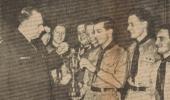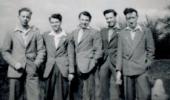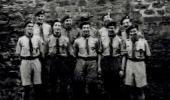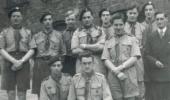
Rover Crew Collection




Nationally, Rover Scouts were introduced in 1918 as a section for older Scouts. Rover Scouts formed themselves into "Crews" and whilst they had some adult leadership were essentially self-governing.
Initially, the age range for Rover Scout membership was not precisely specified. In 1921, the Conference of Rover Scouts stated that 'A Rover Scout is usually a Senior Scout aged aged 17 years and over'.
A "Rover Squire" was on probation for entry into the Crew and "Rover Scout" was an invested member of the Crew.
Initially, they worked for Progress Badges
(or "Special Proficiency Badges") along with a Rambler Badge and Rover Instructor Badge.
In the 1950s, a new Badge Scheme was introduced which included the Queen's Scout Award and the Baden Powell Award.
In 1956, the upper age limit was set at 24.
Rover Scouts were discontinued in 1966/7 following the publication of The Advance Party Report.
Records show that Rovers in the 59th St Augustine's started along with the rest of the UK in 1918. However they do not appear on the annual census until 1921 when there were four. The Crew's numbers varied considererably - from zero to a peak of 26 (in 1946 - presumably demobilisation affecting this number). At the time they were discontinued, there were four of them.
The first recorded Rover Scout Leader was
C Tombs in 1946.
Only one member of the Crew (A Whittaker) is recorded as having achied the Baden Powell Award.
See also Terry Mounsey's "History of the Rover Crew 1945-1956".
Some would argue that the discontinuation of Rover Scouts was a serious blow to the recruitment of Section Leaders.
| 15400 | Photos - Rover Camp at Homestead - 1959 |
